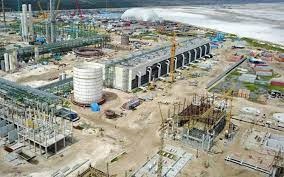For the umpteenth time, there are reports that the Dangote Refinery will soon be inaugurated. We hope that the news is real this time around.
It is good news that the 650,000 barrels per day, bpd, refinery will come on stream and will drastically reduce Nigeria’s shameful dependence on petrol imports, thereby reducing the country’s excessive wastage of foreign exchange.
Last year, a report by Moody’s, a leading global rating agency, had indicated that when it comes on stream, the refinery would lead to a modest improvement in Nigeria’s current account. In 2021, for example, Nigeria spent over $14 billion on importing petroleum products.
“Dangote refinery will improve Nigeria’s current account modestly when fully operational. Substituting imported refined petroleum by domestic products will save current transport cost and other related costs on an import bill that reached $14 billion in 2021.
“Indeed, while Nigeria would no longer need to import refined petroleum, it would also lower the country’s export of crude oil since a part of the production would be used domestically,” Moody’s had said.
We believe Dangote’s efforts must be complemented by the government. Notably, the Nigerian National Petroleum Company Limited, NNPCL, owns four refineries with a combined installed capacity of 445,000 barrels per day. However, none of them is producing a drop of product but if what the Minister of State for Petroleum Resources, Timipre Sylva, said recently is anything to go by, the 60,000bpd old Port Harcourt Refinery would also come on stream soon. In fact, Sylva said emphatically that Nigeria would stop fuel importation by 2024. That could be possible if NNPCL is able to recover most of its idle production capacity.
Thus, it is evident that if things work out as envisaged, the country’s external reserves and economy in general should be healthier from 2023 and thereafter because thousands of jobs will be created locally while the use of a huge amount of dollars to import products that ordinarily should be produced in Nigeria will stop.
Definitely, the demand for dollars to import petroleum products will reduce drastically in 2023 and should help in stabilizing the naira exchange rates. However, we believe that pricing of the petroleum products, when produced locally, should be reflective of that fact. Many Nigerians usually point to the fact that although the raw materials for cement production are sourced mainly locally, the prices are prohibitive and do not reflect that fact.
Thus, the government must ensure that petroleum products locally produced are fairly priced and Nigerians are supplied first. After satisfying local demand, Nigeria could thereafter be a major exporter to neighbouring countries.
‘Dangote refinery will improve Nigeria’s current account modestly when fully operational. Substituting imported refined petroleum by domestic products will save current transport cost and other related costs on an import bill that reached $14 billion in 2021.’
|
ReplyForward
|
